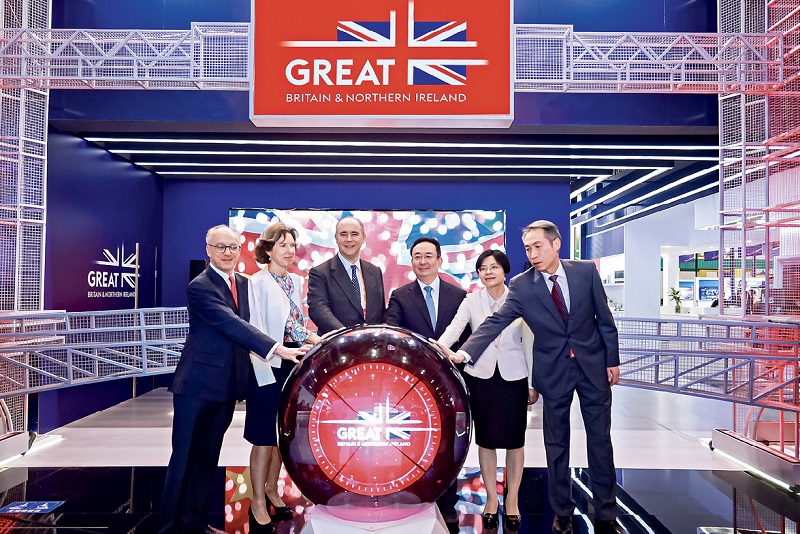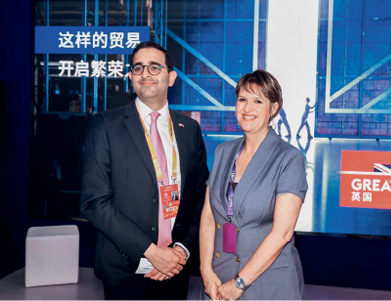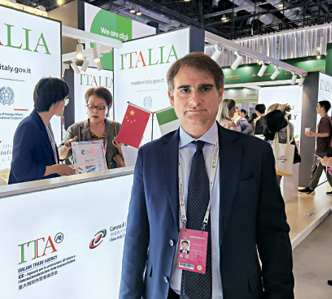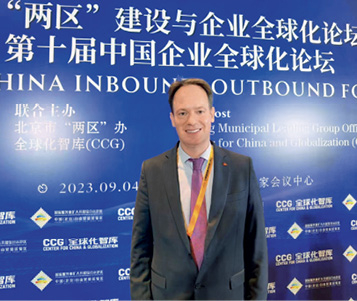The 2023 China International Fair for Trade in Services shows a new trend in China-Europe ties.

The British national pavilion debuts at the 2023 CIFTIS on September 2, 2023.
The sprawling 224-square-meter British national pavilion opened in style at the 2023 China International Fair for Trade in Services (CIFTIS) in Beijing on September 2, by launching a miniature Tower Bridge, the iconic drawbridge of London over the Thames.
As the guest country of honor, the U.K. brought its largest business delegation to date with more than 60 firms and institutions, showcasing its strengths in a spectrum of industries. They spanned cultural creativity, sports, education, science and technology, energy, healthcare, and financial services. The virtual and augmented reality devices at the pavilion provided interactive experiences, giving visitors a glimpse into the country’s role in the development of simulation scenarios for sports, wildlife conservation, and vocational education.
A Bridge for Collaboration
The Tower Bridge at CIFTIS symbolized the connection between China and the U.K. through trade in services and free flow of trade.
“The U.K. and China are really important countries when it comes to trade in services around the world. The establishment of active trade relations between the two sides is beneficial to both countries and also to the world,” said Geraldine McCafferty, deputy head of mission at the British embassy in Beijing, describing CIFTIS as an ideal platform for both countries to deepen their cooperation and expand market access in the services sector.
At the opening ceremony of the British national pavilion, Xia Linmao, executive vice mayor of Beijing, drew attention to Beijing being the only city in China to enjoy the “Two Zones” policy, or favorable policies for building the Integrated National Demonstration Zone for Opening up the Services Sector and the China (Beijing) Pilot Free Trade Zone. The city will align with international trade rules and advance high-level opening-up to unlock greater potential and drive long-term, robust economic growth, he said.

Rahul Ahluwalia (left), minister-counsellor and director for financial & professional services and investment at the British embassy in Beijing.
Rahul Ahluwalia, minister-counsellor and director for financial and professional services and investment at the British embassy in Beijing, shared some statistics with China Today. The U.K. is the world’s second largest service exporter, and around 80 percent of its economic outputs are contributed by the service industry, he said. China is the second largest trading partner of the U.K., and there is still huge potential for cooperation between the two countries in the services sector, he added, noting that from 1997 to 2020, the average annual growth rate of U.K.-China trade in services was 12.2 percent.

Sebastian Wood, chairman of Schroders China.
Schroders, a famed British investment company, is a beneficiary of China’s opening-up policies in the financial sector. In an exclusive interview with China Today, Sebastian Wood, chairman of Schroders China and former U.K. ambassador to China, said his company has been in the Chinese market for more than 30 years. “China is quite a big part of our global business. We have a wide range of capabilities here, and we want to use all of this strength to build our business,” Wood said.
Prompted by China’s strong economic recovery expectations and accelerated financial opening-up, Schroders China decided to establish a wholly-owned subsidiary public fund management company in China, and obtained approval from the China Securities Regulatory Commission on January 10, 2023.
“The Chinese market is still emerging. So, it has enormous growth potential,” Wood said. Most Chinese savings are kept either in banks or are invested in property. Only a small percentage is invested in publicly listed securities, shares and bonds. However, in the U.S., for example, around 30 percent of public wealth is invested in such assets. “So clearly the Chinese market is going to develop in that direction. And it is a very, very large opportunity for the global asset management industry,” he said.
In recent years, China has been opening the investment market to more foreign investors, which has been welcomed by global investors. “It is good for Chinese individual investors and also good for the Chinese economy. We’re very proud to have this long-term strategic commitment to be part of China’s opening-up,” Wood added.
“We have a strong ESG (environmental, social and governance) record internationally. We look forward very much to bringing that capability to China to help China’s carbon transition and support the regulators in the government as they put policies in place that will accelerate the shift to zero carbon,” Wood said. It is important for investors to reduce their carbon footprint as the world chases a zero-carbon goal. Companies that are serious about reducing their carbon emissions are the ones that create the most value, he said.
High Hopes for China-EU Exchanges
The pavilion of Ireland, known as the “Emerald Isle,” attracted visitors at the 2023 CIFTIS with its eye-catching green style. A regular participant in CIFTIS, the country is known for its quality agricultural products, higher education, hi-tech and innovation, as well as its picturesque landscape and unique culture.

Ann Derwin, ambassador of Ireland to China, introduces the products of an Irish company at the Irish national pavilion of the 2023 CIFTIS on September 2.
Ann Derwin, Irish ambassador to China, told China Today in an exclusive interview that CIFTIS is an excellent opportunity to showcase Ireland’s strengths in the services sector. Derwin said trade in goods between Ireland and China increased by 37 percent last year, while bilateral trade in services grew by 16 percent. The two countries are highly complementary in trade in services. With the Chinese government’s commitment to high-quality development, she hopes that trade in services between Ireland and China will grow exponentially.
She also introduced the products of Nasal Medical, an Irish medical device company that makes nasal equipment for healthy breathing. According to the ambassador, Ireland is now the second largest exporter of medical technology products in Europe and the biggest employer of medical technology professionals in Europe per capita. This year, several well-known Irish medical device companies were at CIFTIS to display their capabilities.

Federico Roberto Antonelli, cultural counselor at the Italian embassy in Beijing and director of the Italian Cultural Institute in Beijing.
At the Italian national pavilion, themed “Italy: The Renaissance of Exquisite Experience at CIFTIS 2023” and sporting a red and green “ITALIA” logo, a large audience dropped by to watch a video featuring the Italian Renaissance culture.
“In today’s complex international situation, cultural exchanges and cooperation are more necessary than ever as they are not only a source of inspiration, but also an important way to understand the basic values of different countries,” said Federico Roberto Antonelli, cultural counselor at the Italian embassy in Beijing and director of the Italian Cultural Institute.
“Both China and Italy have created splendid civilizations during the long span of human history, and a wealth of spiritual and cultural heritage,” he said. “At this historic moment, Italy draws inspiration from its unique cultural identity and sends a strong message to China of conducting cross-cultural collaboration and dialogues in the cultural sector. We firmly believe that art and culture are universal languages that can bring diverse civilizations, countries and people closer together.”
Italy boasts two periods of cultural brilliance – ancient Rome and the Renaissance, which have also inspired more than a dozen Italy-themed exhibitions curated and held in Beijing, Shanghai, and other Chinese cities for the vast Chinese audience. These exhibitions include the Light of Ancient Roman Civilization at the Beijing World Art Museum of the China Millennium Monument, self-portraits of famous artists from Italy’s Uffizi Gallery on display at the National Museum of China, and the Centenary Triptych exhibition in Beijing, celebrating the centenary of Leonardo da Vinci, Raphael and Dante.
“China and Italy are both stellar examples of Eastern and Western civilizations,” said Antonelli, who hopes Italy and China will have more cooperation in various cultural fields, including films, modern art and design, food, fashion and other creative industries.
Twenty Italian firms and institutions were present, whose lines of business ranging from industrial design, engineering services, legal services, financial insurance, transportation and logistics to cultural services. The trade between China and Italy over the past five years has increased by 42 percent, from US $50 billion to nearly US $80 billion last year, official statistics show. Italy’s exports to China have increased by about 30 percent. Platforms such as the China International Import Expo and China International Consumer Products Expo have facilitated the entry of Italian goods into thousands of Chinese homes.
Dividends Brought by Institutional Innovation
“The world economy has undergone structural changes over the past five decades, with the proportion of the services sector in global GDP jumping from 53 to 67 percent, taking up more than two-thirds of the global growth,” Yi Xiaozhun, former vice minister of commerce of China and former deputy director-general of the World Trade Organization, said at the 10th China Inbound-Outbound Forum at CIFTIS on September 4. Co-organized by the Center for China and Globalization and the Beijing Two Zones Office, the forum showcased the success of Beijing’s “Two Zones” and corporate globalization.
Yi said the service sector is ubiquitous in the entire national economy, and has its share even in the traditional manufacturing industry. The digital economy is also seen as the rising new trend. In 2022, the total export value of services provided through digital networks reached US $3.8 trillion, equivalent to 54 percent of the global exports in services.
He suggested that priority be given to ensuring an open services sector, which includes an enabling business climate for foreign investors, preferential policies in all aspects to improve the free flow of funds, personnel, information and technology, and facilitating the entry and exit procedures of personnel.
Liu Meiying, deputy director-general of the Beijing Municipal Commerce Bureau and deputy director-general of the Beijing Municipal Leading Group Office for the “Two Zones,” said Beijing leads the country in three aspects: industrial openness, free flow of production factors, and foreign enterprises.

Adam Dunnett, secretary-general of the EU Chamber of Commerce in China.
Adam Dunnett, secretary-general of the EU Chamber of Commerce in China, showed his confidence to China Today that Beijing’s “Two Zones” will have a world-class business environment that will create better conditions for domestic and foreign companies to develop their businesses.
Dunnett also mentioned a document released by the State Council on August 13, the Opinions to Further Optimize the Environment for Foreign Investment and Increase Efforts to Attract Foreign Investment 2023. It details 24 policy measures in six aspects, including ensuring better use of foreign investment, creating a level playing field for both domestic and foreign businesses, and increasing financial and tax support to improve the business environment for foreign investors and boost foreign investor confidence.
“The business climate is crucial,” Dunnett said. In addition to greater market access and further opening-up, the innovative development of enterprises also requires more convenient access to cross-border data for business analysis and decision-making. In addition, free flow of talent across the country should be guaranteed in the fields of medical treatment, child education and international travel.
It is also necessary to maintain regular high-level meetings between the EU and China to ensure timely and effective communication, and build mutual trust and confidence, Dunnett added.
With the resilience of global supply chains being the cynosure of all eyes, Dunnett said it is pivotal to strengthen the cooperation in trade in services for resilient and stable global industrial and supply chains, which will boost the sustained growth of the world economy.